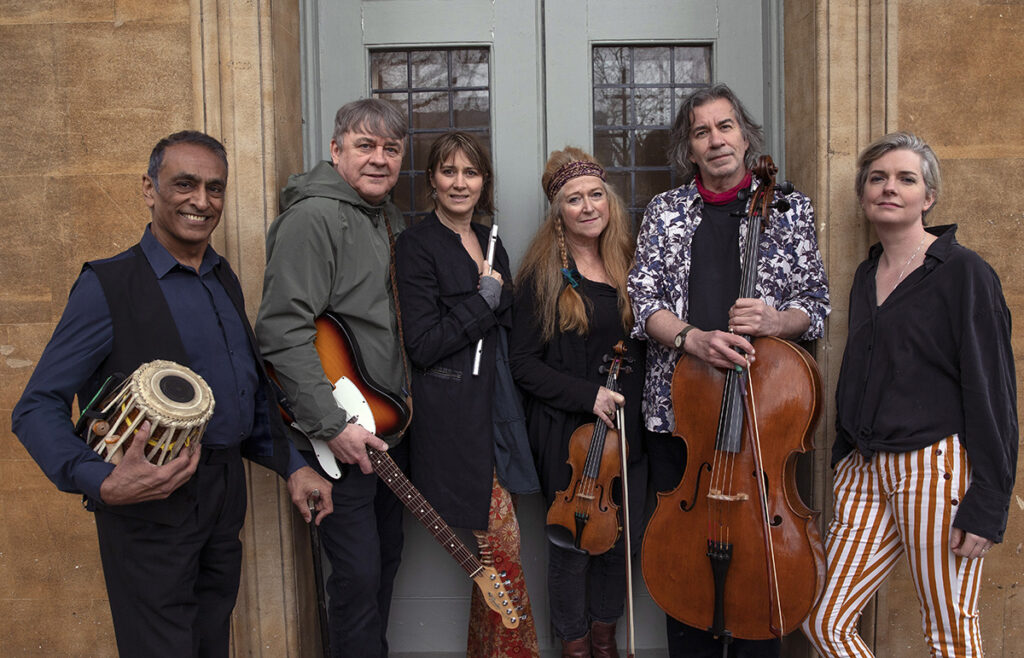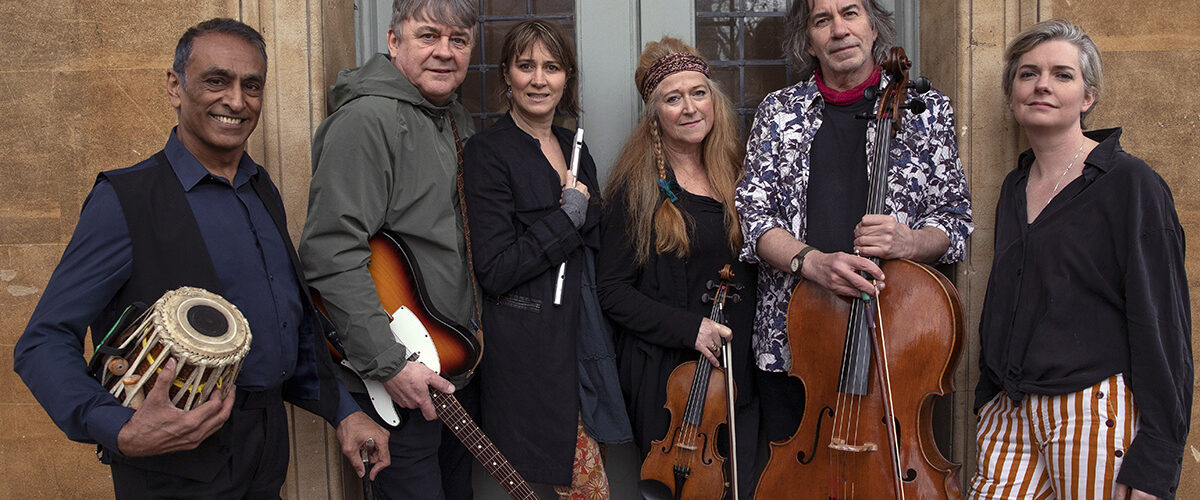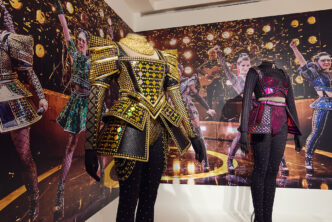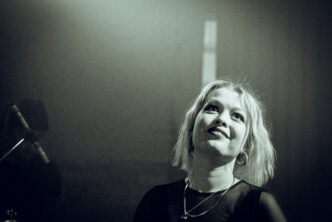Musician and producer, Eliza Marshall brings her award-winning album, Freedom to Roam – The Rhythms of Migration back on tour, with a stop at Bury Met on 11 May. The event, which includes the screening of a documentary film by Director Nicholas Jones, and visual art from Amelia Kosminsky, combines different art forms to provoke thoughts and inspire conversations about our interconnectedness.
Carmel Thomason talks to flautist, Eliza about the development of the Freedom to Roam project and the power of art to inspire people towards creating positive solutions for a better future.
We loved the show when we first saw it at Stoller Hall back in February 22. It felt so relevant to the world then, as it still does now. What inspired you to create it?
Eliza: “I feel eternally lucky as a musician that what I love doing also somehow pays my bills. But I also feel we have a wonderful platform as artists; I’ve always been inspired by creatives who use their music, art or film to try to better the world, or the lives of others. I was desperate to set up something that resonated with all the topics that are so relevant today – climate change, mental health, humanitarian compassion, connection with – and the necessary preservation of – our natural world”.
Why did you choose to write an instrumental piece with no lyrics?
Eliza: “A good question! Many of us work recording large soundtracks for Hollywood movies with the likes of Hans Zimmer, Ennion Morricone – huge icons in the world of film music. I loved the idea that you can grasp people’s attention with just the music – attaching it to the stories in the film – and enhanced by the stunning visual art which completes the immersive experience. It was important to me that we didn’t introduce each track, that it runs like a film soundtrack , allowing the listener to be completely engulfed in the story”.

How did the writing team of four come together?
Eliza: “I studied at The Royal Academy of Music with Catrin Finch, we were great friends and both loved performing and wiring music from all genres. Jackie Shave and I met whilst touring with Peter Gabriel in 2010, she was leader of Britten Sinfonia at the time and we continued to work together on many recording projects over the years. She was a huge influence on me and the choices I made musically. Donal Rogers is my partner in life as well as Ranagri, and I love that he comes from a totally different style of writing – he can’t read a note, but can produce melodies and music that I can only dream of conjuring. To bring these wonderful friends together was a dream team.
“We actually did a lot of writing separately, as we weren’t able to meet up during covid, but I was very clear about the journey of the music. I’ve actually only written a small part at the top of the album, followed by music from Catrin and then several tracks from Jackie, taking us to the final tracks from Don. But it all fits together perfectly. You have to see it to believe it!”
The evening starts with ‘Connected’, a half hour documentary directed by Nicholas Jones, which you co-produced. What was the idea behind screening a film before the performance?
Eliza: “I didn’t really realise the enormity of my idea, until we were on our way to Scotland for the first part of our filming. But it was important to me – especially as the music was without lyrics – that we could portray the underlying ideas which have forged the main mission behind the Freedom To Roam ethos; that despite our endless negative bombardment of news, there are some ordinary people doing extraordinary things. There are uplifting possibilities everywhere, there are solutions to problems – small and large – and there are people coming together to work hard for a better world.
“Imagine if 80% of what we are told were the positive stories? The things we could all get involved with? This is an era of polarisation, of bubble-vision through social media platforms”.
Can you tell us a bit more about the visual art that accompanies the album performance?
Eliza: “Amelia Kosminsky is an incredible visual art designer. We had never met in person, due to social restrictions, until the first performance. But we spent hours discussing each track, the meaning, the topics we wanted to portray, and how the flow of the evening should be.
“All composers sent ideas over, and Amelia brought her unique interpretations which flow through the evening. From dry, arid deserts, to flowing rainforests, enslaved humans to the wonders of elephants, child refugees to the caress of a mother’s cheek with her baby. Interspersed with small shots taken from the documentary, and clips of music from the performance, it ties the triptych together”.
How does it feel as a musician to perform an album live all the way through?
Eliza: “Exhausting, exhilarating, uplifting, engaging. It’s the most amazing feeling at the start – to know you are stepping into 50 minutes of non-verbal storytelling – taking people on a journey with you. I absolutely love it, and it makes me nervous too!”
How important is it for you to produce work that speaks to social issues and why do you think music is such and effective medium for encouraging change?
Eliza: “Music has an ability to touch people in a way that many other forms of communication can’t reach. Whether it is classical, folk, rap, pop, we are all able to connect in some way. We know the power of music for illnesses such as dementia or Alzheimers, but using it to connect on every day topics, with people of all ages and stages of life, is a real privilege.
“I’m passionate about connecting people. I hate that we live in such polarisation, that we don’t engage in debate and society appears to judge one another’s politics and views and an often aggressive manner. We see podcasts such as The Rest Is Politics – two humans with opposing politics – at the top of the podcast charts. Why is this? In my opinion, people are in need of honest discussions, good conversations where we can listen to, and discuss, different opinions.
“I would encourage people of all thoughts to join Freedom To Roam, I’m keen to remain a-political, to be open to all opinions without aggression. If I can use my productions and music to encourage this then I will be fulfilled!”
The Freedom To Roam project is much more than a single album or event. Can you tell us a bit more about how you see the future of the work?
Eliza: “It is! Through Freedom To Roam I’m commissioning further collaborations – music, film, visual artists – with concerts and outreach work being planned for 2024. There are so many brilliant projects doing great things – Music Declares Emergency, Earth Percent, The Nest Collective the more we can use our mediums the more we can hopefully spread our message. I’m so excited about what we have in the pipe-line.
“I’ve always loved curating events, and love huge challenges. This pushed me to new limits and I’m extremely proud of what we achieved. I have big plans for the future, and believe you have to pursue everything you want to in life, no boundaries or fears. It takes all my efforts, and I’m a massive workaholic, but the rewards are amazing. If we can touch just one person, or motivate positive changes, my job as a musician and producer has been started. Touch a few hundred and I’ll feel happy, a few thousand and my job has been done.”
Is there anything else you’d like to say about the show?
Eliza: “Thanks to everyone who has supported us so far: Arts Council England, The Royal Philharmonic Society, Worcestershire County Council, and a successful Kickstarter Award. We have raised over £2500 for charities including The Born Free Foundation, Trees For Life, Malvern Welcomes, and Right To Roam.
“Interested in finding out more? Sponsor us, collaborate or just get in touch www.freedomtoroam.earth Empowering Positive Solutions Through Music Film And Visual Art”.
Freedom to Roam is at The Bury Met on 11 May 2023 before continuing its tour.





